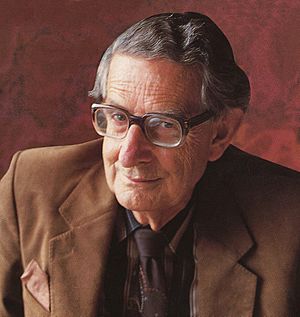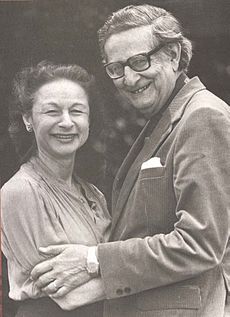Hans Eysenck facts for kids
Quick facts for kids
Hans Eysenck
|
|
|---|---|
 |
|
| Born |
Hans Jürgen Eysenck
4 March 1916 |
| Died | 4 September 1997 (aged 81) London, England
|
| Nationality | German |
| Citizenship | British |
| Alma mater | University College London (UCL) |
| Known for | Intelligence, personality psychology, Eysenck Personality Questionnaire, differential psychology, education, psychiatry, behaviour therapy |
| Scientific career | |
| Fields | Psychology |
| Institutions | Institute of Psychiatry King's College London |
| Doctoral advisor | Cyril Burt |
| Doctoral students | Jeffrey Alan Gray, Donald Prell |
Hans Jürgen Eysenck (/ˈaɪzɛŋk/ EYE-zenk; 4 March 1916 – 4 September 1997) was a German-born British psychologist who spent his professional career in Great Britain. He is best remembered for his work on intelligence and personality, although he worked on other issues in psychology. At the time of his death, Eysenck was the most frequently cited living psychologist in the peer-reviewed scientific journal literature.
Eysenck's research purported to show that certain personality types had an elevated risk of cancer and heart disease. Scholars have identified errors and suspected data manipulation in Eysenck's work, and large replications have failed to confirm the relationships that he purported to find. An enquiry on behalf of King's College London found the papers by Eysenck to be "incompatible with modern clinical science".
In 2019, 26 of his papers (all coauthored with Ronald Grossarth-Maticek) were considered "unsafe" by an enquiry on behalf of King's College London. Fourteen of his papers were retracted in 2020, and journals issued 64 statements of concern about publications by him. David Marks and Rod Buchanan, a biographer of Eysenck, have argued that 87 publications by Eysenck should be retracted.
During his life, Eysenck's claims about IQ scores and race, first published in 1971, were a significant part of his public reputation. Eysenck believed IQ scores were hereditary and genetically influenced by biological race. He had cited studies which claimed black children's average IQ score was 12 points lower than white children. Eysenck's writing on this belief was used as justification for discriminatory schooling in Britain in the 1970s. Eysenck's beliefs on race have been disputed by subsequent research, and are no longer accepted as part of mainstream psychology.
Contents
Life
Eysenck was born in Berlin, Germany. His mother was Silesian-born film star Helga Molander, and his father, Eduard Anton Eysenck, was an actor and nightclub entertainer who was once voted "handsomest man on the Baltic coast". His mother was Lutheran and his father was Catholic. Eysenck was brought up by his maternal grandmother who was a Jewish convert to Catholicism. Subjected to the Nuremberg laws, she was deported and died in a concentration camp. An initial move to England in the 1930s became permanent because of his opposition to the Nazi party and its persecutions. "My hatred of Hitler and the Nazis, and all they stood for, was so overwhelming that no argument could counter it." Because of his German citizenship, he was initially unable to gain employment, and he came close to being interned during the war. He received his PhD in 1940 from University College London (UCL) working in the Department of Psychology under the supervision of Professor Sir Cyril Burt, with whom he had a tumultuous professional relationship throughout his working life.
Eysenck was Professor of Psychology at the Institute of Psychiatry, King's College London, from 1955 to 1983. He was a major contributor to the modern scientific theory of personality and a brilliant teacher who helped find treatment for mental illnesses. Eysenck also created and developed a distinctive dimensional model of personality structure based on empirical factor-analytic research, attempting to anchor these factors in biogenetic variation. In 1981, Eysenck became a founding member of the World Cultural Council. He was the founding editor of the international journal Personality and Individual Differences, and wrote about 80 books and more than 1,600 journal articles. With his first wife, Hans Eysenck had a son Michael Eysenck, who is also a psychology professor. He had four children with his second wife, Sybil Eysenck: Gary, Connie, Kevin, and Darrin. Hans and Sybil Eysenck collaborated as psychologists for many years at the Institute of Psychiatry, University of London, as co-authors and researchers. Sybil Eysenck died in December 2020, and Hans Eysenck died of a brain tumour in a London hospice in 1997. He was an atheist.
The Eysenck's home was at 10 Dorchester Drive, Herne Hill, London from 1960 until their respective deaths.
Posthumous reevaluation
Eysenck's work has undergone reevaluation since his death.
Psychologist Donald R. Peterson noted in letters written in 1995 and published in 2005 that years earlier he had stopped trusting Eysenck's work after he tried to replicate a study done in Eysenck's lab and concluded that the results of the original study must have been "either concocted or cooked".
2019 King's College London enquiry
In 2019 the psychiatrist Anthony Pelosi, writing for the Journal of Health Psychology, described Eysenck's work as unsafe. Pelosi described some of Eysenck's work as leading to "one of the worst scientific scandals of all time", with "what must be the most astonishing series of findings ever published in the peer-reviewed scientific literature" and "effect sizes that have never otherwise been encountered in biomedical research." Pelosi cited 23 "serious criticisms" of Eysenck's work that had been published independently by multiple authors between 1991 and 1997, noting that these had never been investigated "by any appropriate authority" at that time. The reportedly fraudulent papers covered the links between personality and cancer.
Following the King's College London enquiry the International Journal of Sport Psychology retracted a paper that was coauthored by Eysenck in 1990. Later, 13 additional papers were retracted. As of the end of 2020, there had been fourteen retractions and seventy-one expressions of concern on papers from as far back as 1946. Some of these are early papers having nothing to do with health and the King's College enquiry "did not specifically name the articles this expression of concern relates to as problematic".
Portraits
There are five portraits of Eysenck in the permanent collection of the National Portrait Gallery, London, including photographs by Anne-Katrin Purkiss and Elliott and Fry.
Biographies
- Buchanan, Roderick J. (2010). Playing with Fire: The Controversial Career of Hans J. Eysenck. Oxford University Press. ISBN 978-0-19-856688-5., review in: Rose, Steven (August 2010). "Hans Eysenck's controversial career". The Lancet 376 (9739): 407–408. doi:10.1016/S0140-6736(10)61207-X.
- Corr, P. J. (2016). Hans Eysenck: A Contradictory Psychology. Macmillan Education-Palgrave. ISBN 978-0-230-24940-0.
- Eysenck, Hans (1997). Rebel with a cause. Transaction Publishers. ISBN 978-1-56000-938-2. https://archive.org/details/rebelwithcauseau0000eyse.
- Gibson, H. B. (1981). Hans Eysenck: The man and his work. Peter Owen. ISBN 978-0-7206-0566-2.
Works
Selected books
- Dimensions of Personality (1947)
- The Scientific Study of Personality (1952)
- The Structure of Human Personality (1952) and later editions
- Uses and Abuses of Psychology (1953)
- The Psychology of Politics (1954)
- Psychology and the Foundations of Psychiatry (1955)
- Sense and Nonsense in Psychology (1956)
- The Dynamics of Anxiety and Hysteria (1957)
- Perceptual Processes and Mental Illnesses (1957) with G. Granger and J. C. Brengelmann
- Manual of the Maudsley Personality Inventory (1959)
- Know Your Own I.Q. (1962)
- Crime and Personality (1964) and later editions
- Manual of the Eysenck Personality Inventory (1964) with S. B. G. Eysenck
- The Causes and Cures of Neuroses (1965) with S. Rachman
- Fact and Fiction in Psychology (1965)
- Smoking, Health and Personality (1965)
- Check Your Own I.Q. (1966)
- The Effects of Psychotherapy (1966)
- The Biological Basis of Personality (1967)
- Eysenck, H. J. & Eysenck, S. B. G. (1969). Personality Structure and Measurement. London: Routledge.
- Readings in Extraversion/Introversion (1971) three volumes
- Race, Intelligence and Education (1971) in US as The IQ Argument
- Psychology is about People (1972)
- Lexicon de Psychologie (1972) three volumes, with W. Arnold and R. Meili
- The Inequality of Man (1973). German translation Die Ungleichheit der Menschen. Munich: Goldman. 1978. With an introduction by Eysenck.
- Eysenck, Hans J.; Wilson, Glenn D. (1973). The Experimental Study of Freudian Theories. London: Methuen.
- Eysenck, Hans J.; Wilson, Glenn D. (1976). Know your own personality. Harmondsworth, Eng. Baltimore etc: Penguin Books. ISBN 978-0-14-021962-3.
- Manual of the Eysenck Personality Questionnaire (1975) with S. B. G. Eysenck
- Eysenck, Hans J.; Wilson, Glenn D. (1976). A Textbook of Human Psychology. Lancaster: MTP Press.
- Eysenck, H. J. & Eysenck, S. B. G. (1976). Psychoticism as a Dimension of Personality. London: Hodder and Stoughton.
- Reminiscence, Motivation and Personality (1977) with C. D. Frith
- You and Neurosis (1977)
- Die Zukunft der Psychologie (1977)
- The Structure and Measurement of Intelligence (1979)
- The Causes and Effects of Smoking (1980)
- Mindwatching (1981) with M. W. Eysenck, and later editions
- The Battle for the Mind (1981) with L. J. Kamin, in US as The Intelligence Controversy
- Personality, Genetics and Behaviour (1982)
- Explaining the Unexplained (1982, 2nd edition 1993) with Carl Sargent
- H. J. Eysenck & D. K. B. Nias, Astrology: Science or Superstition? Penguin Books (1982), ISBN: 0-14-022397-5
- Know Your Own Psi-Q (1983) with Carl Sargent
- …'I Do'. Your Happy Guide to Marriage (1983) with B. N. Kelly.
- Personality and Individual Differences: A Natural Science Approach (1985) with M. W. Eysenck
- Decline and Fall of the Freudian Empire (1985)
- Rauchen und Gesundheit (1987)
- The Causes and Cures of Criminality (1989) with G. H. Gudjonsson
- Genes, Culture and Personality: An Empirical Approach (1989) with L. Eaves and N. Martin
- Mindwatching (1989) with M. W. Eysenck. Prion, ISBN: 1-85375-194-4
- Genius: The natural history of creativity (1995). Cambridge University Press, ISBN: 0-521-48014-0
- Intelligence: A New Look (1998)
Edited books
- Handbook of Abnormal Psychology (1960), later editions
- Experiments in Personality (1960) two volumes
- Behaviour Therapy and Neuroses (1960)
- Experiments in Motivation (1964)
- Eysenck on Extraversion (1973)
- The Measurement of Intelligence (1973)
- Case Histories in Behaviour Therapy (1974)
- The Measurement of Personality (1976)
- Eysenck, Hans J.; Wilson, Glenn D. (1978). The Psychological basis of ideology. Baltimore: University Park Press. ISBN 978-0-8391-1221-1.
- A Model for Personality (1981)
- A Model for Intelligence (1982)
- Suggestion and Suggestibility (1989) with V. A. Gheorghiu, P. Netter, and R. Rosenthal
- Personality Dimensions and Arousal (1987) with J. Strelau
- Theoretical Foundations of Behaviour Therapy (1988) with I. Martin
Other
- Preface to Pierre Krebs. Das Unverganglich Erbe
See also
 In Spanish: Hans Eysenck para niños
In Spanish: Hans Eysenck para niños
- Biological basis of personality
- EPQ
- Scientific racism


